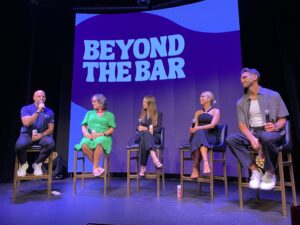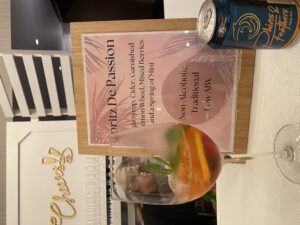Meeting Mentor Magazine
Is It Time to Rethink the Drinks?
 One conference staple has been the networking happy hour, usually featuring free-flowing alcohol to loosen people up. Now that so many are going alcohol-free (or at least, being sober curious), it’s time to rethink what it means to belly up to the bar at an event.
One conference staple has been the networking happy hour, usually featuring free-flowing alcohol to loosen people up. Now that so many are going alcohol-free (or at least, being sober curious), it’s time to rethink what it means to belly up to the bar at an event.
Did you know that well over a third of American adults are abstaining from alcohol altogether? This is especially true for the youngest generations now entering the workforce, and coming to events — 64% of legal-drinking-age Gen Zer’s in the U.S. said they had not consumed alcohol in the first six months this year, according to the International Wine and Spirits Record (IWSR), a global drinks data and analytics provider.
Perhaps it started with the Dry January movement. Perhaps it’s just one more aspect of the overall trend toward health and wellness. Perhaps there are a growing number of people who want to feel at the top of their game for the morning meeting. Wherever it comes from, this appears to be a growing trend that meeting and event organizers shouldn’t ignore.
But, you may say, we provide sodas, juices and water for those who don’t want alcohol — isn’t that enough? Not really, said the panelists at a discussion called “Beyond the Bar” that took place during IMEX America 2024 at Jimmy Kimmel’s Comedy Club in Las Vegas this fall, hosted by Caesars Entertainment and OTHR Agency in partnership with CEMA (the Corporate Event Marketing Association).
As panelist Carl Radke, advisor for Loverboy, owner of Soft Bar in Brooklyn and star of Summer House on Bravo, said, “Just because you don’t drink alcohol doesn’t mean you deserve a lesser experience.”
“People want a permission structure to show up as their full self and feel valued,” added Alyssa Hart, Global Sales Manager at OTHR Agency. “Events are probably the biggest ‘third space’ right now, so we’ve got to think about the duty of care we have as gatherers of people in these spaces to make them feel included.”
With inclusivity and creating welcoming space for all being a growing concern now, why do organizers create specialty cocktails designed for their conference but not a non-alcoholic mocktail that’s equally special, served at the bar in a nice cocktail glass just like what everyone else gets?

ConferenceDirect’s CD+Forum offered a non-alcohol version of the event’s specialty cocktail, which consisted of mango syrup and cider, garnished with a lemon wheel, mixed berries and a sprig of mint.
Some organizers are catching onto this often-not-thought-of way to make their event truly inclusive. One example of an event that took this advice to heart was ConferenceDirect’s CD+Forum, held at the Swan and Dolphin Resort in Orlando in November. In addition to offering a specialty cocktail at the opening reception, the non-alcohol version was prominently displayed on the bar, consisting of mango syrup and cider, garnished with a lemon wheel, mixed berries and a sprig of mint.
The IMEX panel, led by moderator David T. Stevens of Olympian Meeting and the host of the Return on Wellness podcast, would have approved. In addition to inclusivity, there are some other practical reasons to offer mocktails, said the IMEX panel of industry experts — who also included Madelyn Olavarria, Principal Global Sales and President of Women at AWS – Amazon Web Services; and Tracy Stuckrath, founder and chief connecting officer at Thrive! Meetings & Events.
• It can save money. Unless you purchase on consumption, a lot of that alcohol ends up not being consumed. And who wants to pay for that? “I can use that budget on other, more tangible things,” said Olavarria.
• It can save on reputation. Stuckrath spoke of an event she worked where an attendee became so overserved that they took a header into a fountain. Who wants to deal with that? And is an alcohol-fueled extravaganza really the image your organization wants to project in this day and age?
• It can help make for more productive meetings. With today’s tight travel budgets, companies really don’t want the attendees they send to an event to be too hungover to make the morning sessions. That’s not making the best use of their time or scarce travel dollars, Olavarria pointed out.
It’s not difficult to make cocktail receptions more inclusive for those who don’t drink alcohol, the IMEX panel emphasized. However, you may find some pushback on the venue side. Be prepared to ask about non-alcohol beverage options early on in the planning process — even during the RFP stage, suggested Stuckrath. Ask for a non-alcoholic option to be a part of your drink-tasting at a site visit. And if your venue says they can’t provide a high-quality non-alcoholic drink option, ask if you can bring in your own non-alcoholic beer, spirits, even wine for the cost of a modest corkage fee.
Design by: Loewy Design